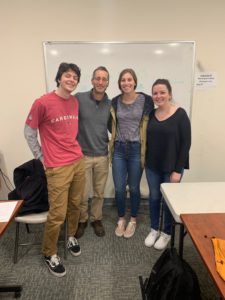CBL Intern, Jerome Siangco ’19 was selected to compete in the first-ever senior exit talks competition: “Share your Magis.” In this competition, those selected to speak were tasked with sharing something about their Holy Cross experience in three minutes with no notes, no props, and no visuals. Jerome came in second place with his speech, “Filling an Empty Car.” Featured in his speech was how CBL was one of the experiences that he filled his car with while here on the hill. Congratulations to Jerome!
Filling an Empty Car
Saturday. August 29. 2015. Move in day for the Class of 2019 and with it, Mass of the Holy Spirit. Near the end of mass Fr. Boroughs, as he does with every incoming class, makes a fun yet serious joke of families departing with an empty car and one less passenger. First years hug their families, some shed a tear or a dozen, and then walk over to the Orientation Leaders both excitedly and hesitantly, to begin their Holy Cross journeys.
Four years later, I think of this joke, of the empty car, and of how the car is symbolic of everyone’s Holy Cross journey.
As a first-year student, everyone comes into the college essentially empty. Some may have Google searched Holy Cross a trillion times, others may be legacies, while some like myself, may have come to Holy Cross knowing nothing about the school, except that it was in a city I could not pronounce. Emptiness comes in the form of not knowing what to realistically expect from college.
However, the years goes by, and one becomes less empty. One is filled daily with new experiences, new memories, that one carries with them until they drive away four years later. A car filled with yes, clothes, books, and other items, but also the individual themselves filled with the memories they have created on their Holy Cross journey. Driving away, they are no longer a Holy Cross student, but a Holy Cross graduate.
Here are three examples of how I have filled my car these four years:
Athletically, I was able to walk onto the Men’s Rowing Team and create stories of freezing outside in the brisk morning air on Lake Quinsigamond.
Spiritually, I was able to participate in a five-day silent retreat where I learned the power of silence and to be comfortable with my own thoughts.
Academically, I was able to take classes that challenged me, meet professors that I now call mentors, and be involved in Worcester through Community-Based Learning.
I provide these three examples from my own life, not to say everyone at Holy Cross should have had similar experiences, but that through these examples, people begin to think of how they have been filled throughout their Holy Cross journey.
As first-years excitedly and hesitantly walked over to their Orientation Leaders, I as a graduating senior and my fellow piers alongside me, all walk, excitedly and hesitantly towards Graduation.
At Graduation seniors will hug their families as they did on move-in day, but they will also hug their new family, a family that was built over four years. As the Holy Cross mission invites everyone into communion with one another, the mission creates an extended family for every Holy Cross student. It is this family, our Holy Cross family, that we do not say good bye to on Graduation, but thank you.
Thank you for the memories. Thank you for the laughs, the tears, the 3 AM trips to Boulevard Diner, every single interaction that has formed our Holy Cross community into a family.




